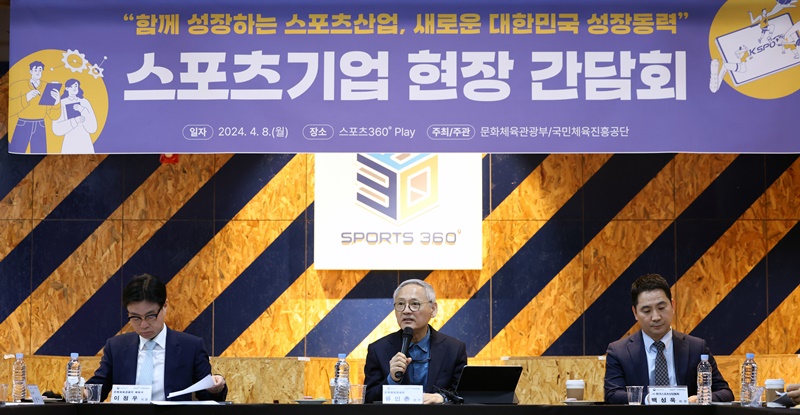-
 Korea.net's 24-hour YouTube channel
Korea.net's 24-hour YouTube channel- NEWS FOCUS
- ABOUT KOREA
- EVENTS
- RESOURCES
- GOVERNMENT
- ABOUT US
View this article in another language
- 한국어
- English
- 日本語
- 中文
- العربية
- Español
- Français
- Deutsch
- Pусский
- Tiếng Việt
- Indonesian

Minister of Culture, Sports and Tourism Yu In Chon on April 8 (center) speaks at Sports 360 Play, an interactive exhibition facility for the sports industry, at a meeting with related figures on his ministry's fourth mid- to long term strategies to develop the sector. (Ministry of Culture, Sports and Tourism)
The government will support the fast-growing sports industry to turn it into a new engine of economic growth.
The Ministry of Culture, Sports and Tourism on April 9 released its fourth mid- to long-term plan for promoting the sector from this year through 2028 as a five-year blueprint for the vision and direction of sports policy.
The four objectives of this plan are boosting the sector's scale from KRW 78 trillion in 2022 to KRW 105 trillion in 2028; raising the number of innovative sports companies with annual sales of KRW 10 billion or more to 1,000; increasing the rate of balanced regional development from 50.2% to 55% due to more businesses based in the provinces; and lifting the number of employees in the industry from 440,000 to 600,000.
The value of the domestic sports industry in 2022 grew 22.3% year on year to KRW 78.1 trillion, showing the sector's rapid recovery close to the pre-COVID-19 epidemic level of KRW 80.68 trillion in 2019.
Accordingly, the government's slogan "Growing Together With the Sports Industry: Korea's New Growth Engine" comes with a three-part strategy.
First, domestic sports companies will receive support to raise their global competitiveness. Including attraction of investment or overseas expansion, stronger comprehensive assistance will go to promising sports companies with annual sales growth averaging at least 20% for three years.
More aid will also go to sports service companies showing high growth. The ministry will select promising items and goods for import substitution among sporting goods; provide research and development funds to secure related core technologies, and raise dependence on such products by other countries.
In addition, the convergence and integration of high value-added industries are expected to create markets and expand the industrial base. To take the lead in developing the market for sports participation and health care services, the ministry will develop artificial intelligence specialized for sports.
It will work over the mid- to long term on broadcast viewing service using extended reality and smart stadium technologies including face recognition and terrorism detection, and expand technologies to enable accessibility for the disadvantaged like vibration-detection seating for disabled people and an app with the lyrics to cheering songs for the hearing impaired.
Another task is to design sports tourism products and support the planning and production of the convergence of sports and content such as entertainment programs and performing arts.
A proposed sports industry ecosystem will be led by provincial regions. An area with a high concentration of private sports businesses will be designated a "sports complex" and receive comprehensive support. The revitalization of regions related to pro sports will come through the distribution of virtual reality sports rooms, construction of air domes, and expansion of the safety and security certification system for sports facilities in each region.
"I'm convinced that the sports industry will emerge as a future growth engine of Korea," Minister of Culture, Sports and Tourism said. "The ministry will mobilize all resources at its disposal to speed up the implementation of strategies and tasks announced this time to make changes in the field felt."
jane0614@korea.kr













